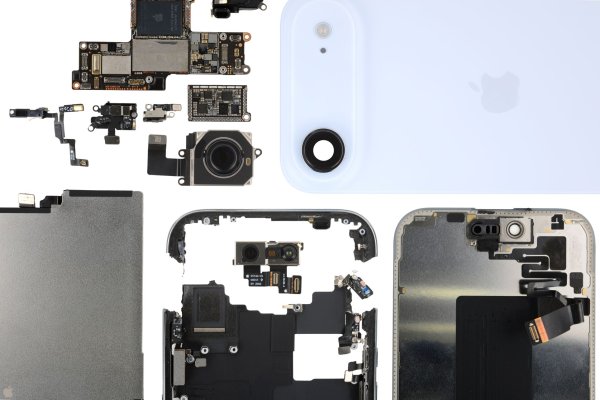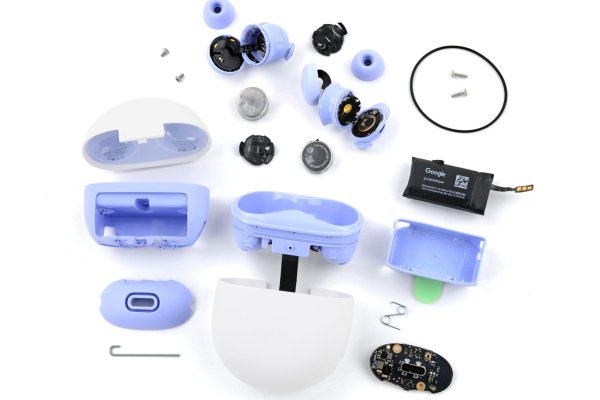Companies copying other companies is nothing new. Sometimes it’s trivial, like when Dell copied Apple’s terrible naming scheme. Sometimes it’s annoying, like when Huawei decided it was a great idea to use pentalobe screws to keep customers out of their own phones.
But it can get a lot nastier, like when Amazon ripped off the design of respected indie bag maker Peak Design’s Everyday Sling, right down to its name. Peak Design called them out in a cheeky video: With the Amazon bag, they said, “You don’t have to pay for all those needless bells and whistles like years of research and development,” recycled materials, and a lifetime warranty.
Like Peak Design, we’ve poured years of research and development into our tools, only to watch billion-dollar companies slap together knockoffs that look eerily similar. Our tools also come with some real bells and whistles. But now, if you pop down to Walmart or Harbor Freight, you can avoid paying for them. You can skip out on our 20+ years of repair industry experience. You can dodge our lifetime warranty. You can sleep tight knowing that you haven’t supported repair education or the fight for the Right to Repair our stuff.
We’ll show you the evidence, and you decide: Are these multi-billion dollar companies ripping off iFixit?
Our Kits Represent Two Decades of Repair Industry Expertise
Here at iFixit, we put a lot of thought into the design of our tools. If you’ve ever used our tweezers, pry tools, screwdrivers, or any of our more specialized tools, you’ll know that they just work. That’s because they’re painstakingly developed by people who actually love fixing things. They have been honed over the decades we’ve been repairing and talking with people who repair professionally, and they will continue to be improved and added to.
We also carefully consider the supply chain, the materials we use, and the people that make our products. All of which makes it even more painful when a huge company like Harbor Freight starts making a toolkit that is, at first glance, almost indistinguishable from our own.
Take a look at Harbor Freight’s “Electronics Repair Kit,” side by side with the Pro Tech Toolkit (use the slider to toggle between them):


Harbor Freight’s copy of our Pro Tech Toolkit looks the same, down to the orientation and organization of the tweezers and the iFixit-blue opening picks. The bit selection is identical. Bits of all shapes and sizes have existed for decades, but our innovation, after writing tens of thousands of repair manuals for just about every kind of electronic device around, was a deliberate selection, picked to make sure that no matter what repair you’re faced with, you’ll almost certainly have the right bit for the job.
In fact, their marketing language even copied ours, inaccurately! They promised a screw-sorting tray in the lid of the kit, but reviews say the lid is “completely flat.” Reviewers also say the tools are flimsy and the foam holding in the bits and driver lifts out of the case.
Here’s another comparison slider:


The Copies Are Flimsy and Poorly Machined

Harbor Freight isn’t the only one. Here’s HART Precision screwdriver Set, made by tool-behemoth TTI and sold exclusively at Walmart. Notice any similarities to our Mako Driver Kit?

What do you think? Did TTI coincidentally come up with a design so similar to ours that even the screwdriver’s handle is the same color blue?
When we say that these kits look identical, we mean it. And we’re more familiar with our own kits than anyone. Until you open the package and start using it, it’s easy to think you’re getting something comparable. But like a bodega “AirPods” dupe, the real test is in the performance, and that’s where these fall flat.
You’ll notice the same easy-to-browse foam bed with its easy-to-pick-and-replace slots holding the bits. You’ll see a very similar driver handle with a blue plastic cap (the one in the iFixit Pro Tech Toolkit is aluminum). But reviews on HART’s own site say the materials are cheap—the driver is “flimsy” and “bent after one screw.”
In product images, HART physically modifies their product to appear the same as iFixit’s designs, showing only the elements that are direct copies of iFixit, and hiding any HART characteristics that could otherwise help the consumer differentiate between brands. The lifestyle photos taken by HART even echo our photo style. Reviewers aren’t fooled, and recognize this is a knockoff of the iFixit kit. HART isn’t trying to hide it in the slightest.

On Close Inspection, the Bits Don’t Hold Up
But how do these kits really stack up in performance? We put the tools under a microscope to see if we could prove a difference. Sure enough, the HART bits were visibly worse: for bit after bit we examined, the HART bits were blobbier, less distinct. Here are Torx 3 bits, iFixit on the left, HART on the right.

The point of the design of a Torx bit, as we described in a recent article about Torx Plus, is to provide constant contact between the bit and the screw. The specialized shape enables high torque without slipping. A poorly machined bit like this HART one will not provide the same contact. It may fit in the screw head, but it is more likely to strip the screw, and you’ll likely not get the same torque.
We saw the same thing on nearly all the bits we examined in comparison. Here’s a Pentalobe 2, the bit you’d use to open an iPhone. Again, iFixit’s bit is on the left and HART’s on the right:

These differences aren’t just cosmetic.
The bit on the right might be close enough to get you into an iPhone once. But if you look closely, you’ll probably notice damage to the screw. Over time, you may find it doesn’t fit in the screwhead at all.
It’s Not Just the Tools. It’s Our Philosophy
Harbor Freight loves to talk about how it’s the fastest growing retailer in the United States.
The tool behemoth is a private company, and Forbes estimates it brought in $7.6B last year. Its CEO just bought a new 350-foot yacht with a helipad and a yoga studio. He’s a famous big spender, and seemingly not a very nice person. In 2010, his own parents accused him of looting the company after he’d made massive personal purchases, including a $100 million painting.
Techtronic Industries, or TTI, is the holding company that makes most of the world’s power tools—Milwaukee, Ryobi, HART, Homelite and even brands like Hoover and Dirt Devil. Forbes lists their 2023 revenue at $13.3B. They’re selling their iFixit knockoff in Walmart. Thanks to low-quality materials, rock-bottom standards, and no need for industrial design, their kits cost a fraction of the price.
Even They Know They Crossed the Line
Of course, none of these companies will admit that they copied our products. But TTI offered to pay us $10,000 to let them keep selling tools with handles that look suspiciously like ours. We didn’t take their dirty money.
For Harbor Freight and TTI, knocking off our work is easy. Copying and pasting is easier than writing your own papers.
Not all copying is bad, of course. In fact, we’ve spent our whole existence encouraging it, when it’s in service of shared values.
Some concepts can and should be copied. We love that the repair spirit has spread far and wide. Repairability scores have proliferated from a concept we coined to the basis of laws around the world. There’s even a whole genre of YouTube teardowns that now rate repairability. Sure it’s competition, but with common enemies like planned obsolescence and repair monopolies, we live for the shared mission. For a universal shift to a repair-first mindset, we need all the help we can get. A world with more people turning screwdrivers is a better one.
But when some of the world’s biggest corporations are selling cheap knockoffs of the tools we’ve spent the past two decades designing and optimizing, it’s a whole different thing. That kind of imitation hurts. It hurts our business, yes, but more importantly it hurts the success of the repair movement.
iFixit’s mission is to help everyone fix every thing. That’s always been a tall order, and we’ve always known we’d need help. That’s why we made iFixit a collaborative wiki. Anyone can add their knowledge to help people fix things. It’s why we partner with university students who donate their time to create thousands of guides for the stuff that all of us want to fix. It’s even the reason we do teardowns: to demystify tech, offer consumer advice, and encourage manufacturers to build better. We have an army of awesome volunteers, lawmakers, and activists to help secure the right to repair.
Why Quality Tools Actually Matter for the Repair Movement
The Right to Repair, and the manuals to help you through those repairs, are only helpful if you can actually open your device. If it’s a hassle to find the screwdriver bits and pry tools you need to get inside your stuff, you’re going to be frustrated. You might not be as inclined to fix something the next time. So we design our tools based on real-world repair experience, what works, what lasts, what makes the job easier.
In the beginning, we constantly struggled with our tools. We filled a suitcase with every possible prying and opening mechanism. As we lugged that heavy suitcase around the world taking apart the latest gadgets, we knew there had to be a better way. We’ve carefully selected the most useful tools for releasing tabs, disconnecting connectors, getting into tight spaces, and picking up small parts.
When the iPhone started shipping with a strange five pointed screw, we designed a compatible driver. When we got reports from our community that it was hard to open coffee makers, we added an oval bit to our Mako.
With our Pro Tech Toolkit, there’s not much you can’t fix. Add in a few standard, larger tools, and maybe an excellent soldering iron, and you’re equal to any task, armed with a set of tools that will last, which can themselves be repaired if they don’t.
We Don’t Want Lawsuits. We Want a Movement
We tried to resolve this privately. But we’re up against billion-dollar corporations with legal teams and war chests. We could spend years and millions fighting them. Or we could spend that time building better tools, writing more guides, and passing more Right to Repair laws.
If you’re with us—if you believe that quality matters, that community matters, that repair matters—here’s how to help: Buy from people who build for fixers, not copycats. Tell Walmart you’d rather see real iFixit kits on their shelves. Keep turning screwdrivers and turning the tide.
We’re not just defending our tools. We’re defending your right to fix. And we’re going to need your help.






crwdns2944067:00crwdne2944067:0